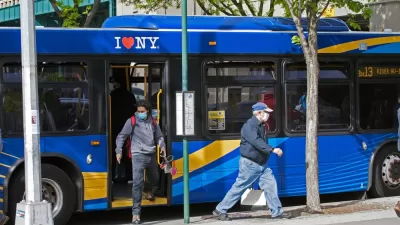Public transit agencies are getting creative in the effort to bring riders back to buses and trains.

"Starting March 1, officials intend to put a weekly fare cap on trips made with OMNY, the 'tap-and-go' fare system," reports Ana Ley for The New York Times.
The threshold for unlimited rides in a seven day period will be set at $33, according to Ley.
The new fare cap is intended to lure riders back to public transit in New York City, where ridership hasn't fully recovered to pre-pandemic levels. Depending on the popularity of the program, and its effects on the Metropolitan Transportation Authority's budget, the fare cap could also be made permanent. For now, the program is scheduled to expire on June 30.
"Although the numbers in New York are climbing, subway ridership in recent weeks has only been hovering at about 58 percent of prepandemic levels, when over five million people packed the trains every weekday," writes Ley.
The state of public transit in the United States at the conclusion of 2021 is tenuous: driver shortages are contributing to service cuts in cities all over the country, and an infusion of federal money has buoyed agencies through declines in ridership and a resulting loss of revenue. Some cities are experimenting with free, or reduced-fare, transit as an enticement to get riders back on buses and trains.
FULL STORY: To Win Riders Back, M.T.A. to Offer Free Rides for ‘Tap-and-Go’ Customers

Planetizen Federal Action Tracker
A weekly monitor of how Trump’s orders and actions are impacting planners and planning in America.

Restaurant Patios Were a Pandemic Win — Why Were They so Hard to Keep?
Social distancing requirements and changes in travel patterns prompted cities to pilot new uses for street and sidewalk space. Then it got complicated.

Map: Where Senate Republicans Want to Sell Your Public Lands
For public land advocates, the Senate Republicans’ proposal to sell millions of acres of public land in the West is “the biggest fight of their careers.”

Maui's Vacation Rental Debate Turns Ugly
Verbal attacks, misinformation campaigns and fistfights plague a high-stakes debate to convert thousands of vacation rentals into long-term housing.

San Francisco Suspends Traffic Calming Amidst Record Deaths
Citing “a challenging fiscal landscape,” the city will cease the program on the heels of 42 traffic deaths, including 24 pedestrians.

California Homeless Arrests, Citations Spike After Ruling
An investigation reveals that anti-homeless actions increased up to 500% after Grants Pass v. Johnson — even in cities claiming no policy change.
Urban Design for Planners 1: Software Tools
This six-course series explores essential urban design concepts using open source software and equips planners with the tools they need to participate fully in the urban design process.
Planning for Universal Design
Learn the tools for implementing Universal Design in planning regulations.
Heyer Gruel & Associates PA
JM Goldson LLC
Custer County Colorado
City of Camden Redevelopment Agency
City of Astoria
Transportation Research & Education Center (TREC) at Portland State University
Camden Redevelopment Agency
City of Claremont
Municipality of Princeton (NJ)





























